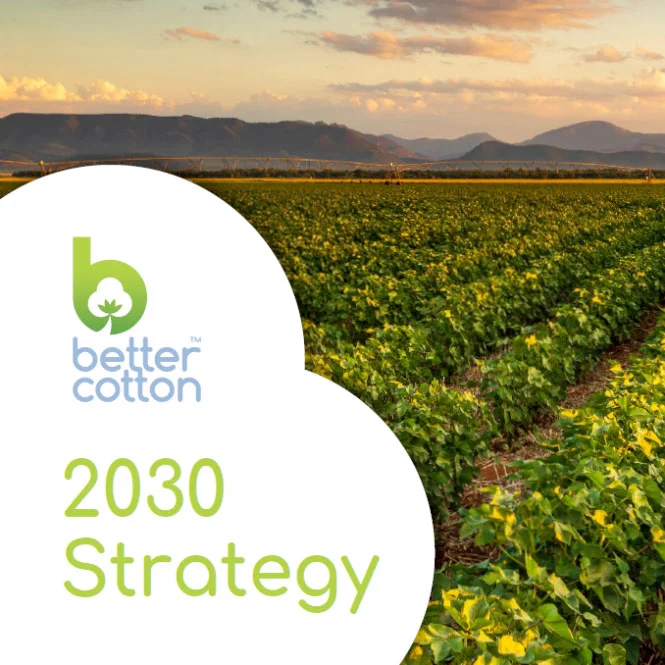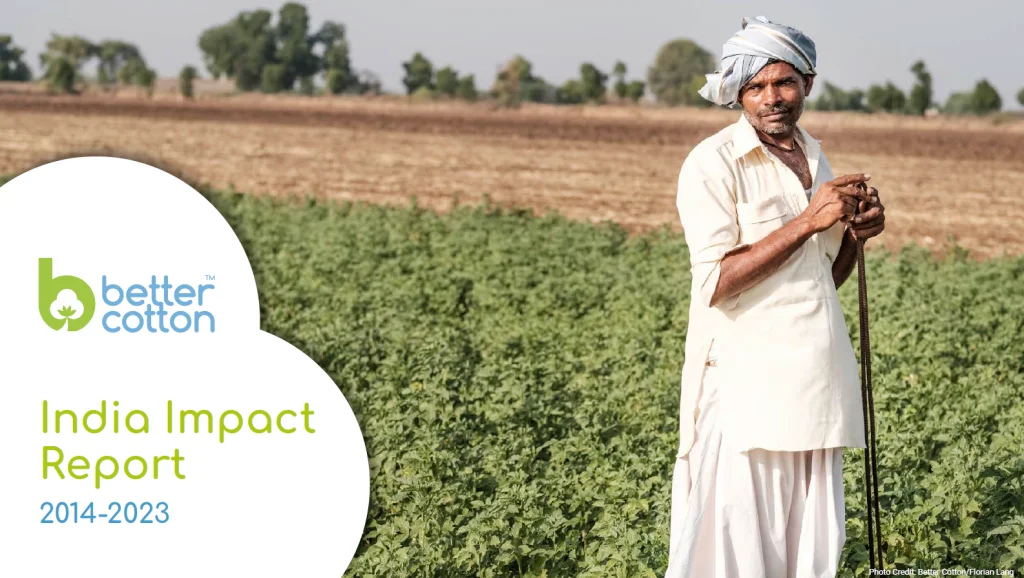Better Cotton is the largest cotton sustainability programme in the world. In just over a decade, stakeholders who span the industry have joined us – farmers, ginners, spinners, suppliers, manufacturers, brand owners, retailers, civil society organisations, donors and governments – to train farming communities to produce cotton in ways that improve things for everyone and everything connected with this fluffy white staple. Currently, our membership adds up to more than 2,700 members.
In 2005, as part of a ’round-table’ initiative convened by WWF, a group of visionary organisations came together to make sure it had a sustainable future. Initial support came from organisations such as adidas, Gap Inc., H&M, ICCO Cooperation, IKEA, International Federation of Agricultural Producers (IFAP), International Finance Corporation (IFC), Organic Exchange, Oxfam, Pesticide Action Network (PAN) UK and WWF.
Cotton is one of the world’s most important renewable natural resources. Safeguarding the growing and production of it is essential. With the support of our stakeholders, we can focus on who and what matters in a sustainable future: farmers, farmworkers, their communities, and their education, knowledge and well-being. Working with close to 60 different field-level partners, we continue to reach more and more of the world’s cotton-farming communities – or as we call it ‘Farmers+’ – to support them in implementing more sustainable practices. Nearly all of them – farmers and farm workers – work on smallholdings less than 20 hectares in size. Helping them to enjoy better yields, improved working conditions and greater financial security has been transformative. Over 2.13 million farmers now have a licence to sell their cotton as Better Cotton. In total, our programmes have reached almost 4 million people whose working lives are connected to cotton production.
Cotton farming communities are the reason Better Cotton exists – supporting them is at the heart of our work. While cotton is a renewable resource, its production is vulnerable to damaging practices. As stewards of the Better Cotton Standard System, our focus is on providing training and development opportunities for farmers to adopt more environmentally, socially and economically sustainable production practices. One of the six components of the standard system, the Principles and Criteria or the Better Cotton Standard, is a holistic approach to more sustainable cotton production implemented at field level. Better Cotton Licensed Farmers produce cotton in a way that cares for the environment, minimising the negative effects of fertilisers and pesticides, and caring for water, soil health and natural habitats. Better Cotton Farmers also commit to decent work principles—conditions that support workers’ safety and wellbeing. The Better Cotton Standard is not applicable to the cotton supply chain. However, Better Cotton Members gain access to sourcing Better Cotton from diverse global regions. Find out more about the Better Cotton Standard.
Yes. Better Cotton welcomes the use, adoption or adaptation of its standard system in cases where it can be used to drive the adoption of more sustainable cotton farming practices. Better Cotton conducts a Public Standard Review Process at least every five years, which also enables third-parties to contribute towards its further development.
A fifth of the world’s cotton is now grown under the Better Cotton Standard. In the 2022-23 cotton season, through our network of field-level partners, 2.13 million licensed Better Cotton Farmers in 22 countries grew 5.47 million tonnes of Better Cotton.
From the farmers who grow Better Cotton to the companies that source it, the Better Cotton Chain of Custody (CoC) is the documentation and evidence of Better Cotton as it moves through the supply chain, connecting Better Cotton supply with demand.
Better Cotton supply chains can implement either Mass Balance or Physical CoC Models: Segregation (single country), Segregation (multi-country) or Controlled Blending.
Mass Balance and Physical CoC Models have different requirements for how Better Cotton or products containing Better Cotton are stored, transported, and processed within the supply chain. Only products sourced via Physical CoC Models are traceable to their country of origin.
To find out more about the Mass Balance CoC Model, click here.
To find out more about Physical CoC Models, click here.
Better Cotton is ISEAL Code Compliant. Our system has been independently evaluated against ISEAL’s Codes of Good Practice–a globally recognised framework for effective, credible sustainability systems. More information at isealalliance.org.
Today, the vast majority of funding for field-level activities comes from Retailer and Brand Members. Moving forward, we are engaging public funders and foundations as well encouraging field-level partners to co-invest in field-level activities and innovation to include other actors to ensure broad ownership of the progress and success being made.
Better Cotton has a unique business model, with members paying a membership fee and non-member users of the Better Cotton Platform paying a service fee to access the platform. Our membership and Better Cotton Platform fees fund our own operations and administrative costs, allowing us to provide services to our members, maintain strong governance, uphold the integrity of the standard system, and encourage brands, retailers and other market players to buy more Better Cotton. There’s also a fee for brands and retailers that varies according to how much Better Cotton they consume. Importantly, it’s this fee – we call it the Volume-Based Fee, levied on every tonne of cotton – that generates the majority of our income, and this all goes directly to supporting learning and assurance activities for farmers in the field, allowing all farmers to participate in our programme’s training and capacity building for free. To date, Better Cotton has raised over €100 million to train more than three million cotton farmers and workers in over 20 countries. Learn more about how we are funded
The Better Cotton GIF identifies and makes strategic investments in Better Cotton field-level programmes and innovations. It is one part of our two-pronged Capacity Building Programme . Next to the Better Cotton Standard System, field-level investments made through the Better Cotton GIF play an important role in enabling us to reach more farmers and train them on sustainable farming practices.
Better Cotton Retailers and Brand Members contribute to the Fund through a fee based on the volume of Better Cotton they procure and declare (Volume-Based Fee or VBF). This fee enables brands to support field level programmes directly and efficiently. Additionally, the Better Cotton GIF invites global institutional donors and government agencies to match the fees contributed by the private sector. The Better Cotton GIF requests and encourages Programme Partners to increasingly contribute to the projects they are running. Find out more about the Better Growth and Innovation Fund.
As of 2023, Better Cotton has more than 2,700 members spanning the cotton supply chain. Find members in our updated list.
Less than 25% of global cotton production is independently verified as grown using more sustainable practices. Better Cotton, Fairtrade, organic standards and others work in a complementary way towards ensuring that all cotton is produced in a more sustainable manner. We have recognised four other standards as equivalent to the Better Cotton Standard, eliminating duplication and inefficiencies in the market: myBMP (Australia), ABR (Brazil), CmiA (multiple African countries) and ICPSS (Israel). Better Cotton support farmers having the ability to choose which farming system is best for them. Better Cotton also actively collaborates across the cotton sector to develop common approaches to measure and report sustainability progress in a harmonized way. Better Cotton leads the Delta Project, funded by SECO through the ISEAL Innovation Fund, and we have been working with OCA, Fairtrade and Textile Exchange, with the support of Forum for the Future facilitating the Cotton 2040 Working Group on Impact Metrics Alignment, to endorse common sustainability indicators and commit to implementing them gradually in our systems. Learn more about the Delta Project.
The International Finance Corporation (IFC) and Deutsche Gesellschaft für Internationale Zusammenarbeit (GIZ) are currently delivering independent sustainable cotton projects in Uzbekistan.
As part of these projects, IFC and GIZ are supporting six cotton-textile Clusters to work towards meeting the conditions laid out in The Better Cotton Principles and Criteria, which are publicly available to whomever wishes to consult or apply them. Better Cotton is providing technical advice to GIZ and IFC as part of their project delivery. However, the Better Cotton Initiative has not – to this date – established a formal Better Cotton Programme in Uzbekistan, therefore, the Clusters being supported are not eligible to be licensed producers of Better Cotton.
The work being carried out by IFC and GIZ is contributing to Better Cotton’s ongoing efforts under the New Country Start-up Process to ascertain if the enabling environment in Uzbekistan in conducive for a Better Cotton to establish a programme. These efforts include engaging with a variety of stakeholders, both within Uzbekistan and internationally.
Cotton farmers around the world face many decent work challenges, ranging from protecting workers from pesticide exposure to identifying and preventing child and forced labour. Decent work challenges typically stem from low wages, the informal nature of working relations in agriculture, and weak enforcement of laws and regulations. Sometimes solutions also require mindset shifts, whether that means getting communities to address and prevent child labour or working to transform long-held gender norms. That’s why understanding the root causes of poor labour practices in an area is necessary to effectively address the circumstances that perpetuate exploitation and abuse. It is an enormous challenge that takes collaboration with key stakeholders across supply chains to drive systemic, positive change together. Better Cotton does not operate in regions where forced labour is orchestrated by the government.
Learn more about our approach to decent work.
We aim to be a mainstream initiative and target improvements across a range of important issues associated with cotton farming on a large scale. Today, nearly three quarters of the world’s cotton is grown with GM seeds. It would be difficult to achieve our objective of making Better Cotton a mainstream sustainable commodity if millions of farmers were automatically excluded from our training and support. So, Better Cotton has adopted a position of being ‘technology neutral’ with respect to GM cotton and will neither encourage farmers to grow it, nor seek to restrict their access to it. If it is legally available in the country of use and there is an overall support package in place for farmers–which includes training and access to a range of farming options–Better Cotton allows the use of GM cotton.


